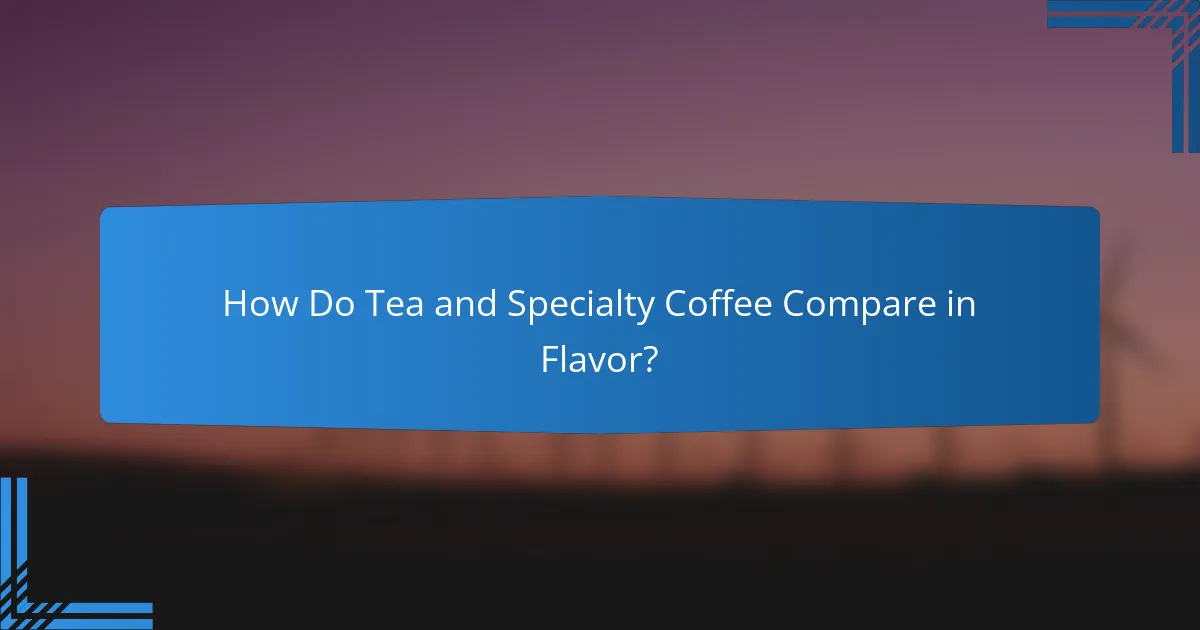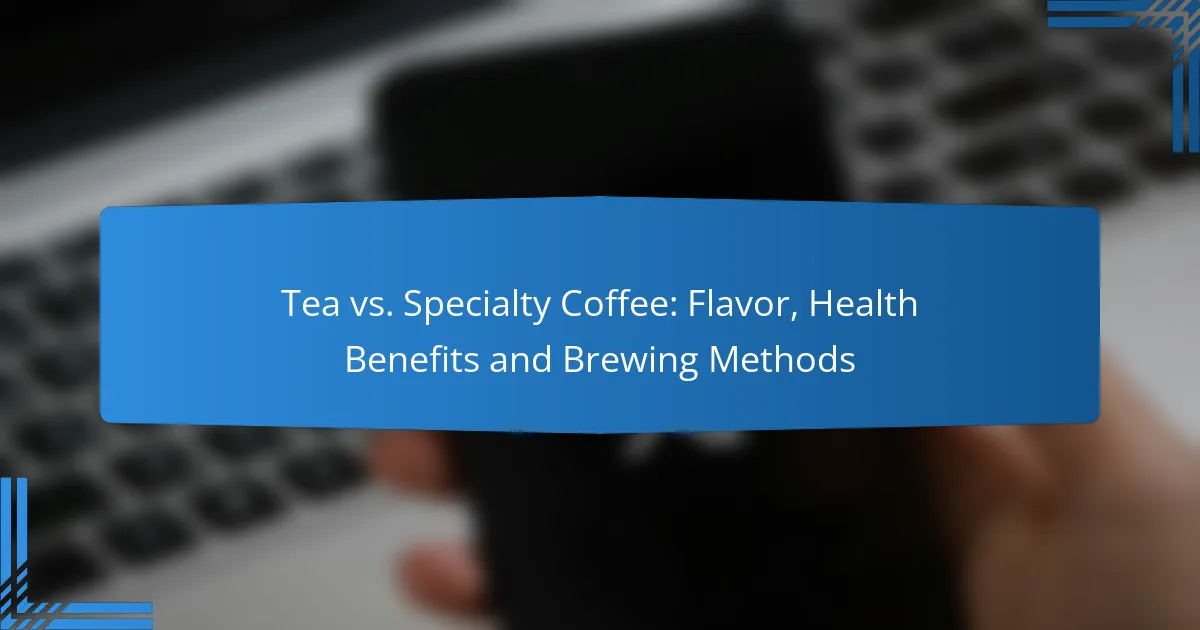Tea and specialty coffee present distinct flavor profiles influenced by their unique ingredients and brewing techniques. While tea offers subtle and delicate notes, specialty coffee is celebrated for its bold and complex flavors. Both beverages provide notable health benefits, thanks to their antioxidant properties and varying caffeine levels, making them appealing choices for different occasions. Understanding the best brewing methods for each can further enhance the overall experience of these beloved drinks.

How Do Tea and Specialty Coffee Compare in Flavor?
Tea and specialty coffee offer distinct flavor experiences shaped by their unique ingredients and preparation methods. While tea tends to have a range of subtle, delicate flavors, specialty coffee is known for its bold and complex profiles.
Tea flavor profiles
Tea flavor profiles vary widely depending on the type of tea and its processing. Green teas often have grassy, vegetal notes, while black teas can present malty or fruity flavors. Herbal teas, which are technically not true teas, can range from floral to spicy, offering a diverse tasting experience.
Factors such as the region of cultivation, the season of harvest, and the brewing temperature can significantly affect the flavor. For instance, Japanese green teas are typically more umami-rich, while Chinese teas may exhibit more floral characteristics.
Specialty coffee flavor profiles
Specialty coffee is characterized by its rich and varied flavor profiles, which can include notes of chocolate, fruit, nuts, and spices. The flavor is influenced by the coffee bean variety, the region it’s grown in, and the roasting process. For example, Ethiopian coffees are often fruity and floral, while Colombian coffees may have a balanced, nutty flavor.
The brewing method also plays a crucial role; espresso tends to concentrate flavors, while pour-over methods can highlight acidity and brightness. Specialty coffee is often evaluated on a scale, with higher scores indicating more complex and desirable flavors.
Key flavor differences
The primary difference between tea and specialty coffee lies in their flavor intensity and complexity. Tea generally offers a more subtle and nuanced flavor experience, while specialty coffee tends to be bolder and more pronounced. Additionally, tea can have a wide range of flavors depending on steeping time and temperature, whereas coffee flavors are more influenced by the roast and brew method.
Another key difference is the presence of caffeine; coffee usually has a higher caffeine content, which can impact flavor perception and overall experience. This can make coffee more stimulating, while tea can provide a gentler lift.
Popular tea and coffee varieties
Popular tea varieties include Earl Grey, Matcha, and Oolong, each offering unique flavor profiles and health benefits. Earl Grey, flavored with bergamot oil, has a citrusy aroma, while Matcha provides a rich, creamy texture and vibrant green color.
In the realm of specialty coffee, popular varieties include Arabica and Robusta, with Arabica being known for its sweeter, more complex flavors. Single-origin coffees, such as those from Guatemala or Kenya, are also highly sought after for their distinctive taste characteristics.
Flavor pairing suggestions
When pairing tea with food, consider lighter teas with delicate flavors, such as green tea with sushi or white tea with light pastries. Black teas can complement richer foods like chocolate desserts or hearty breakfast dishes.
For specialty coffee, consider pairing it with chocolate, nuts, or pastries. The bold flavors of coffee can enhance the sweetness of desserts, while fruity coffees can work well with breakfast items like pancakes or fruit salads.

What Are the Health Benefits of Tea and Specialty Coffee?
Tea and specialty coffee both offer unique health benefits, largely due to their rich antioxidant content and varying caffeine levels. While tea is often praised for its calming effects and hydration, specialty coffee is recognized for its potential to enhance alertness and cognitive function.
Health benefits of tea
Tea, particularly green and black varieties, is known for its numerous health benefits, including improved heart health and reduced risk of certain cancers. The presence of polyphenols in tea can help lower blood pressure and improve cholesterol levels.
Additionally, herbal teas like chamomile and peppermint can aid digestion and promote relaxation. Regular consumption of tea may also support weight management due to its metabolism-boosting properties.
Health benefits of specialty coffee
Specialty coffee is associated with several health benefits, including enhanced mental alertness and improved physical performance. The caffeine in coffee can boost energy levels and improve focus, making it a popular choice for those needing a quick pick-me-up.
Moreover, coffee contains antioxidants, which may help protect against diseases such as Parkinson’s and type 2 diabetes. Moderate coffee consumption has also been linked to a lower risk of liver disease and certain types of cancer.
Comparative health effects
When comparing the health effects of tea and specialty coffee, both beverages have their unique advantages. Tea generally promotes relaxation and hydration, while coffee is more effective for immediate energy and alertness.
Individual responses can vary, so it’s essential to consider personal tolerance to caffeine and any specific health conditions. For instance, those with anxiety may prefer tea, while individuals seeking a boost in productivity might opt for coffee.
Antioxidant content
Both tea and specialty coffee are rich in antioxidants, which play a crucial role in combating oxidative stress in the body. Green tea is particularly high in catechins, a type of antioxidant that has been linked to various health benefits.
On the other hand, coffee contains chlorogenic acid and other compounds that contribute to its antioxidant profile. Regular consumption of either beverage can help reduce inflammation and lower the risk of chronic diseases.
Caffeine levels
Caffeine levels vary significantly between tea and specialty coffee, influencing their effects on the body. A typical cup of coffee contains about 95 mg of caffeine, while black tea has around 40-70 mg, and green tea usually contains 20-45 mg.
For those sensitive to caffeine, tea may be the better option due to its lower content. However, coffee’s higher caffeine concentration can provide a more substantial energy boost, making it suitable for those needing increased alertness.

What Are the Best Brewing Methods for Tea and Specialty Coffee?
The best brewing methods for tea and specialty coffee depend on the desired flavor profile and the characteristics of the beverage. Each method has unique techniques that can enhance the overall experience, making it essential to choose the right approach for each drink.
Tea brewing techniques
Tea brewing techniques vary widely depending on the type of tea. Common methods include steeping loose leaves in hot water, using tea bags, or employing a French press. Each technique can affect the flavor, aroma, and strength of the tea.
For example, green tea typically requires a lower temperature (around 70-80°C) and a shorter steeping time (2-3 minutes), while black tea benefits from boiling water (100°C) and a longer steep (3-5 minutes). Adjusting these variables can significantly impact the final taste.
Specialty coffee brewing techniques
Specialty coffee brewing techniques focus on extracting the best flavors from high-quality beans. Popular methods include pour-over, French press, Aeropress, and espresso machines. Each method allows for different levels of control over variables like water temperature and brewing time.
For instance, pour-over brewing emphasizes precision, allowing for a clean and bright cup, while French press offers a fuller body due to the immersion process. Experimenting with these techniques can help you discover your preferred flavor profile.
Equipment recommendations
Choosing the right equipment is crucial for both tea and coffee brewing. For tea, a good quality kettle with temperature control, a tea infuser, or a teapot can enhance the brewing process. For specialty coffee, consider investing in a burr grinder, a scale for measuring coffee and water, and a reliable brewing device like a Chemex or espresso machine.
Quality equipment can make a significant difference in flavor extraction and consistency, so prioritize tools that suit your brewing style and preferences.
Brewing time and temperature
Brewing time and temperature are critical factors that influence the extraction of flavors in both tea and coffee. For tea, different types require specific temperatures and steeping times to achieve optimal flavor. For example, herbal teas often need boiling water and longer steeping times, while delicate white teas require cooler water and shorter steeping.
In specialty coffee, the ideal brewing temperature is typically between 90-96°C, with a brewing time ranging from 2-4 minutes, depending on the method. Adjusting these parameters can help you fine-tune the taste to your liking.
Common brewing mistakes
Common brewing mistakes can lead to subpar tea and coffee experiences. For tea, over-steeping or using water that is too hot can result in bitterness, while under-steeping may yield a weak flavor. Always follow recommended guidelines for each type of tea.
In specialty coffee, using stale beans, incorrect grind size, or improper water-to-coffee ratios can negatively impact the taste. Aim for a consistent grind and measure your ingredients to avoid these pitfalls and enhance your brewing results.

How Do Preferences for Tea and Specialty Coffee Vary by Region?
Preferences for tea and specialty coffee differ significantly across regions, influenced by cultural traditions, local availability, and flavor profiles. For instance, while tea is predominant in many Asian countries, specialty coffee has gained traction in North America and parts of Europe.
Regional tea preferences
In Asia, tea is deeply embedded in cultural practices. Countries like China and Japan prioritize green and oolong teas, often consumed during traditional ceremonies. In contrast, India is famous for its robust black teas, such as Assam and Darjeeling, typically enjoyed with milk and spices.
In Europe, tea consumption varies; the British favor black tea, often served with milk, while countries like Russia have a strong preference for strong, brewed black teas. The popularity of herbal teas is also rising, reflecting a growing interest in wellness and natural remedies.
In Africa, tea is enjoyed in various forms, with countries like Kenya producing significant amounts of black tea for export. Local customs often dictate how tea is prepared and served, with some regions favoring sweetened versions or adding spices.
